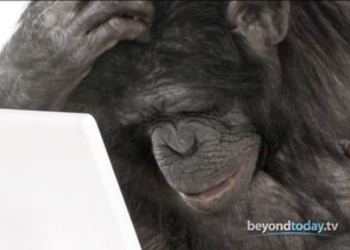Evolution's Probability Is Humorously Slim

There is this great scene in a movie I once saw. A guy has tried his hardest to pursue the woman of his dreams, and he finally asks her the big question: what are his chances that they could become a couple? 1 out of a 100?
She responds, “No, more like one out of a million.”
As he drops his head to think about her answer, a contemplative look washes over his face. Then he looks up. His eyes are getting a little bigger, as he says with excitement building in his voice, “So, you're telling me there's a chance!”
Call it hope, call it optimism, or maybe just call what it really is: faith.
The very probability of one out of a million seems to scream "this is not going to happen," but that doesn't seem to stop us sometimes from hoping. Even the very fact that the odds got worse tells you that the woman’s point was not that he had a chance, but that he didn’t have a chance.
The leap of faith required to believe in evolution is similar to this man’s faith that he had a chance. The probability of evolution is directly analogous to this man’s humorously slim odds.
With Infinite Amount of Time, Anything is Possible
There is a lot in the teachings of evolution that makes a lot of sense. But this teaching always rubbed me the wrong way: with an infinite amount of time, anything is possible. While I can certainly put together an argument showing that this is perfectly logical, it ignores the fact that there are all these other ramifications that would help validate it—or invalidate it.
One of my friends recently gave an example of this on his blog, when he wrote about the Boltzman Brain. The teaching supposes, hypothetically, that given enough time through billions and trillions of years, all the atoms needed to form a self-contained brain would convene in one spot floating in the middle of space. This brain would already have feelings and emotions and memories locked into it.
Where Are All the Monkey Brains?
Again, the Boltzman Brain makes perfect sense and given the chance, is a logical conclusion given an infinite amount of time. But logic is not truth. The problem is that if a brain could be formed in the depths of space with memories, then we should be seeing, even in our limited life-span of 70 years here on earth, all kinds of examples of strange things just appearing.
Don’t you remember the half banana that appeared out of thin air on the wall in that downtown Chicago pizza place back in 1994? How about the random popcorn kernels appearing over the Suez Canal in 1972? How about that story your great grandmother tells of her great grandmother finding this fluffy thing that is described eerily like a blue colored Kleenex? Where are all the random monkey brains appearing in our house that didn’t quite make it to become Boltzman Brains?
Missing Accidents
With the Infinite Monkey Theorem, we have a very logical thought process: eventually, given enough time, all the works of Shakespeare would be reproduced by an infinite amount of monkeys sitting at typewriters. The problem however, is that it would leave an awful lot of accidents—parts of Shakespeare at different levels of completion, all over the place. There would be an infinite amount of in-between stages of partials, and lots and lots of failures. Lots of accidents. An over abundance in fact—so much so that we should be overrun by the accidents.
But so many of the so-called accidents are missing.
The odds are so slim, but yes, I am admitting evolutionists have a chance.
Do we really want to take it, though?
